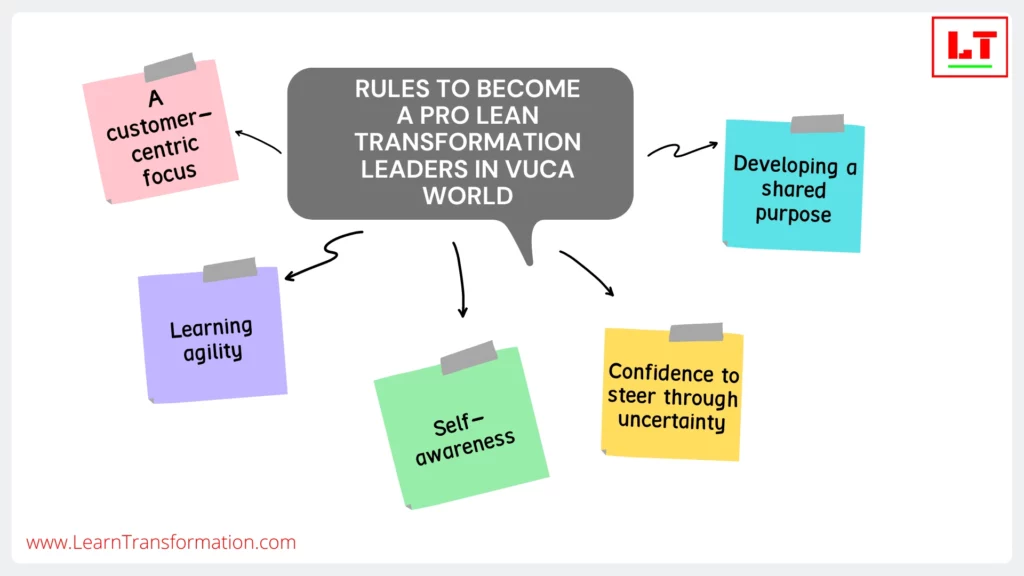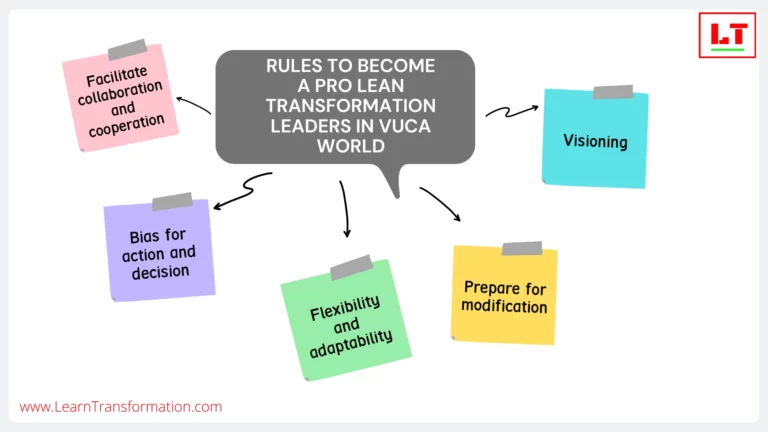Lean transformation is an approach to managing and organising work that aims to improve a company’s performance.
Master Lean Transformation Leadership and Drive Business Success
Ashridge Professor Vicki Culpin said Lean Transformation Leaders need to develop the resilience to keep going when everything around them is constantly changing. Moreover, Vicki proposes ten skills that are vital to be able to lead successfully in a VUCA world.
So, Let’s explore some Rules –
10 Rules to Become A Lean Transformation Leader
1. Visioning-
Being able to obviously outline the core worth proposition of the organization and the way you and your team match into it through your daily contributions is essential in times of VUCA environment.
2. Prepare for modification-
Monitoring as well as pursuing trends, competitors, and the business surroundings to spot patterns as well as variables that will impact your team and the organization will provide you with an early warning of potential imminent modification.
3. Flexibility as well as adaptability-
In times of uncertainty and alteration, a perfect leadership attribute is the ability to be versatile as well as adjustable. Further, VUCA leadership needs one to not to stick in their ways and stiffly work against their annual arrangement.
4. Bias for action as well as decision-

Certainly, In VUCA leadership having a bias for action is essential. It’s the flexibility to form a call once you have incomplete info. It cannot totally notice the quality and interconnectivity of the choice being created.
Also Read: What Is Total Quality Management (TQM): 5 Key Fixes To Implement TQM Effectively
Leader’s Tip:
By encouraging collaboration, innovation, and a concentration on client value, create a culture of continuous improvement.
5. Facilitate collaboration and cooperation-
When leading through the VUCA environment, innovative thinking and plan diversity, which needs input across all functions and levels within the organization, is needed to uncover new solutions.
6. A Lean transformation leader should have a customer-centric focus-
So, No matter how your performance is within the organization, having a client-centric specialization can impact the customer expertise at the forefront of selections being created is a vital element in leading in a very VUCA world.
7. Lean transformation leaders should learn agility-
Furthermore, Tomorrow’s leaders have to be compelled to be willing to stretch themselves out of their temperature. And also, broad-minded enough to embrace new ideas.
Learn More: Best Books
8. Lean transformation leader should be self-awared-
Leaders want an understanding of their own strengths and areas for development and also the impact their communication and dealing vogue has on others.
9. Confidence to steer through uncertainty-
So, The ability to assess acceptable levels of risk as well as create selections supporting incomplete or perhaps conflicting info is vital. Leaders additionally want the flexibility to be told from mistakes and to permit others to try to to constant.
10. Lean transformation leaders should Develop a shared purpose-
The ability to create groups wherever staff have a shared purpose as well as vision is vital. So, Leaders have to be compelled to facilitate their individuals to know the larger image and the way they in-person match.
“In the VUCA world, Leadership is not just leading a team in a conventional manner, it means leading a team with a Vision, Understanding, Courage and Adaptability”.
Leader’s Tip:
“Embrace agility and adaptability, and empower your team to effectively respond to volatility, uncertainty, complexity, and ambiguity.”
Check out the Video-
FAQs
How do you become a lean leader?
Rules to Become Lean Transformation Leader
Visioning, Prepare for modification, Flexibility and adaptability, Bias for action and decision, Facilitate collaboration and cooperation
What are the 5 lean principles?
5 keys lean principles are:
- Value
- Value stream
- Flow
- Pull
- Perfection
Key Takeaways
- Leaders must promote a philosophy of efficiency, customer-centricity, and waste reduction in order to implement lean transformation.
- Lean transformation leadership success in a VUCA world depends on proactive communication, transparency, and trust.”
- Leaders must lead by example, engage and develop their team, and promote a culture of learning and innovation,” said one leadership expert.

